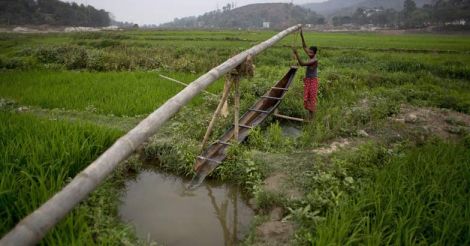The Prime Minister has called for a second Green Revolution, with a special emphasis on eastern India where there is a huge gap between agricultural production and productivity.
The Green Revolution was made possible through a combination of technology, government policy and farmers’ enthusiasm. The government policy excited the farmers because it was based on the cost of production and procurement with fair price.
Farmers’ fortunes are determined by the monsoon and the markets. Fortunately, the government has set aside more money for irrigation through Krishi Sinchai Yojana as part of recent initiatives to help farmers. A national online agriculture market is another step in that direction.
The Green Revolution had come under criticism from environmentalists even in the 60s. This criticism stemmed from concerns that the overuse of pesticides and fertilisers would destroy the soil, water and biodiversity and thereby cause the stagnation of agricultural growth.
I had warned about the impact to the environment from excessive use of fertilisers and pesticides and the overexploitation of soil and water, at the Indian Science Congress in Varanasi in January 1968.
“Intensive cultivation of land without conservation of soil fertility and soil structure would lead, ultimately, to the springing up of deserts. Irrigation without arrangements for drainage would result in soils getting alkaline or saline.
Indiscriminate use of pesticides, fungicides and herbicides could cause adverse changes in biological balance as well as lead to an increase in the incidence of cancer and other diseases, through the toxic residues present in the grains or other edible parts. “Unscientific tapping of underground water will lead to the rapid exhaustion of this wonderful capital resource left to us through ages of natural farming. The rapid replacement of numerous locally adapted varieties with one or two high-yielding strains in large contiguous areas would result in the spread of serious diseases capable of wiping out entire crops like what happened ahead of the Irish potato famine in 1845 or the Bengal rice famine in 1942.
“Therefore the initiation of exploitative agriculture without a proper understanding of the various consequences of every one of the changes introduced into traditional agriculture, and without first building up a proper scientific and training base to sustain it, may only lead us, in the long run, into an era of agricultural disaster rather than one of agricultural proseperity.”
So I prefer to use the term “evergreen revolution” rather than a second green revolution. The stress is on increasing yield without environmental and social costs. This also involves a shift from product-based approach to a farming-based approach. I prefer evergreen revolution to green revolution to mean that we can cultivate food and other crops without damaging soil fertility and the natural foundations that are needed for long-term agricultural prosperity.
The eastern areas urgently need an evergreen revolution that would benefit lakhs of small land holders through agriculture and associated sectors.




































































































































































































































































































































































































































































































































































































































 The Green Revolution had come under criticism from environmentalists even in the 60s. Picture for representational purpose
The Green Revolution had come under criticism from environmentalists even in the 60s. Picture for representational purpose
Disclaimer
The comments posted here/below/in the given space are not on behalf of Manorama. The person posting the comment will be in sole ownership of its responsibility. According to the central government's IT rules, obscene or offensive statement made against a person, religion, community or nation is a punishable offense, and legal action would be taken against people who indulge in such activities.